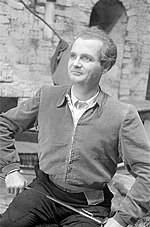Peter Anders (singer)
Peter Anders (born July 1, 1908 in Essen , † September 10, 1954 in Hamburg ) was a German opera singer ( tenor ).
Life
Peter Anders joined a church choir at the age of twelve . He completed his training as a book auditor in Berlin and took singing lessons from 1928. After studying with Ernst Grenzebach and at the Berlin Conservatory , he also received lessons from the contralto Lula Mysz-Gmeiner . In 1932 Anders made his debut in Heidelberg , in 1938 he became a member of the Bavarian State Opera in Munich. In 1939 an engagement at the Berlin State Opera followed . He was included on the so-called God-gifted list of Reich Propaganda Minister Goebbels as an important artist.
After the Second World War , Anders moved to the Hamburg State Opera in 1948 . His solo career took him via Darmstadt , Cologne , Hanover , Munich , Berlin , Dresden , Salzburg , Edinburgh and Vienna to Hamburg . In the early 1950s, Anders' lyrical tenor voice began to get harder and more powerful. In this way he was able to open up the great heroic games. His Otello in Giuseppe Verdi 's opera of the same name was a great success at the Hamburg State Opera in 1950 . With the Croatian soprano Sena Jurinac he recorded the love duet from the opera mentioned. The recording shows an almost perfect Otello. Anders designed his role with the vocal means of the tenor trained in Mozart operas and dispensed with effects such as volume, etc., as was customary with Mario del Monaco , who was celebrated as a model Otello at the time .
Peter Anders was married to the soprano Susanne Mysz (1909–1979), a daughter of his singing teacher Lula Mysz-Gmeiner . The marriage came from the singer Ursula Anders , the singer and actress Sylvia Anders (born March 17, 1943 in Berlin) and the tenor Peter Laurent Anders .
On September 4, 1954, Peter Anders made a guest appearance in Plettenberg, Westphalia . On September 5, 1954, while driving from Hanover to Hamburg, he suffered an accident with the car he was driving himself. He died of the injuries five days later in the Hamburg harbor hospital . His grave is in the Ohlsdorf cemetery . In 1976 in Berlin-Neukölln high-deck settlement the Peter-Anders-Straße named after the artist.
Interpretations
Peter Anders' interpretations of Rodolfo in La Bohème , Florestan in Fidelio , Cavaradossi in Tosca , Don José in Carmen , Stolzing in Die Meistersinger von Nürnberg and the title roles in Otello and Lohengrin set standards that are still valid today.
A mono cross-section through the complete recording of the opera Hoffmann's Tales by Jacques Offenbach with Peter Anders in the title role appeared in the GDR in the early 1960s. Rita Streich , Erna Berger , Margarete Klose and Jaro Prohaska will sing alongside Peter Anders in this recording from 1946, which is declared a “historic recording” ; Artur Rother conducts the Berlin Radio Soloists' Association and the Berlin Radio Symphony Orchestra. The cross-section was also published on CD.
Anders was also a successful song singer. He played Franz Schubert's Winterreise twice . The first recording, accompanied by Michael Raucheisen , was made under the most difficult of circumstances in January and March 1945 in the Berlin "Haus des Rundfunks". The second from 1948, accompanied by Günther Weißenborn , for the WDR as well as his interpretations of the Beethoven songs “Adelaide” and “Ich liebe dich” are still considered milestones today - despite all the sound technical deficiencies of the time.
The operetta recordings by Peter Anders also occupy a special position. Even today they don't sound old-fashioned or superficial. Peter Anders viewed the “light muse” as an art form in its own right that had to be interpreted with the same seriousness and artistic commitment as a Mozart opera. Particularly noteworthy are the recordings that Anders made with the conductor Franz Marszalek (for the WDR in Cologne and for the Polydor label of the Deutsche Grammophon Gesellschaft). Several complete recordings were made at WDR: The Gypsy Baron and Carnival in Rome by Johann Strauss , The Land of Smiles and Paganini by Franz Lehár and Liebe im Dreiklang by Walter Wilhelm Goetze (here Peter Anders stepped in for the sick Karl Friedrich at short notice ).
literature
- KJ Kutsch , Leo Riemens : Large singer lexicon . Unchanged edition. KG Saur, Bern, 1993, first volume A – L, Sp. 58 f., ISBN 3-907820-70-3
- Ferdinand Kösters: Peter Anders. Biography of a tenor. Monsenstein et al. Vannerdat, Münster 2008. ISBN 978-3865826794
Web links
- Peter Anders in the Bavarian Musicians' Lexicon Online (BMLO)
- Works by and about Peter Anders in the catalog of the German National Library
- Christian Graeber: biography and discography .
- ORF: Death at its zenith .
Individual evidence
- ^ Ernst Klee : The culture lexicon for the Third Reich. Who was what before and after 1945. Completely revised edition. Fischer-Taschenbuch-Verlag, Frankfurt am Main 2009, ISBN 978-3-596-17153-8 .
- ↑ Brockhaus Music: Lemma Peter Anders. Mannheim / Leipzig 2006.
- ↑ Website with family chronicle Peter Anders ( memento of the original from October 20, 2013 in the Internet Archive ) Info: The archive link was automatically inserted and not yet checked. Please check the original and archive link according to the instructions and then remove this notice. , read June 23, 2013
| personal data | |
|---|---|
| SURNAME | Different, Peter |
| BRIEF DESCRIPTION | German opera singer (tenor) |
| DATE OF BIRTH | July 1, 1908 |
| PLACE OF BIRTH | eat |
| DATE OF DEATH | September 10, 1954 |
| Place of death | Hamburg |


